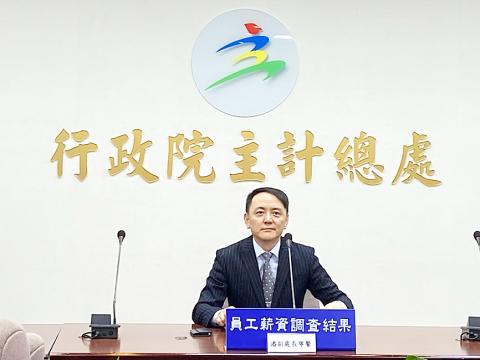Average monthly take-home wages picked up 1.5 percent to NT$42,348 (US$1,405) in January, while total pay, including overtime and perks, grew 8.95 percent to NT$102,561 on the back of Lunar New Year bonuses, the Directorate-General of Budget, Accounting and Statistics (DGBAS) said yesterday.
The latest wage data have yet to reflect the effects of COVID-19 that have increased the number of people on unpaid leave to more than 2,200 as of Wednesday, it said.
Firms selling metal and machinery products have been hardest hit, while a reduction in working hours is quickly extending to hotels and restaurants.

Photo: Cheng Chi-fang, Taipei Times
“The virus outbreak could weigh on wage data from last month and the agency would closely monitor evolving changes,” DGBAS Deputy Director Pan Ning-hsin (潘寧馨) told a news briefing in Taipei.
In January, take-home pay declined to the slowest rate in three years, DGBAS said, attributing it to fewer working days.
After adjustments for inflation, real average wages fell 0.29 percent from a year earlier, the agency’s data showed.
Wages among companies in the tourism sector fell within normal seasonal rates in January, but things could change going forward, Pan said.
Economists have said that the COVID-19 outbreak could push back an expected recovery in the tech cycle by one to two quarters, if not snapping it altogether.

In Italy’s storied gold-making hubs, jewelers are reworking their designs to trim gold content as they race to blunt the effect of record prices and appeal to shoppers watching their budgets. Gold prices hit a record high on Thursday, surging near US$5,600 an ounce, more than double a year ago as geopolitical concerns and jitters over trade pushed investors toward the safe-haven asset. The rally is putting undue pressure on small artisans as they face mounting demands from customers, including international brands, to produce cheaper items, from signature pieces to wedding rings, according to interviews with four independent jewelers in Italy’s main

Japanese Prime Minister Sanae Takaichi has talked up the benefits of a weaker yen in a campaign speech, adopting a tone at odds with her finance ministry, which has refused to rule out any options to counter excessive foreign exchange volatility. Takaichi later softened her stance, saying she did not have a preference for the yen’s direction. “People say the weak yen is bad right now, but for export industries, it’s a major opportunity,” Takaichi said on Saturday at a rally for Liberal Democratic Party candidate Daishiro Yamagiwa in Kanagawa Prefecture ahead of a snap election on Sunday. “Whether it’s selling food or

CONCERNS: Tech companies investing in AI businesses that purchase their products have raised questions among investors that they are artificially propping up demand Nvidia Corp chief executive officer Jensen Huang (黃仁勳) on Saturday said that the company would be participating in OpenAI’s latest funding round, describing it as potentially “the largest investment we’ve ever made.” “We will invest a great deal of money,” Huang told reporters while visiting Taipei. “I believe in OpenAI. The work that they do is incredible. They’re one of the most consequential companies of our time.” Huang did not say exactly how much Nvidia might contribute, but described the investment as “huge.” “Let Sam announce how much he’s going to raise — it’s for him to decide,” Huang said, referring to OpenAI

The global server market is expected to grow 12.8 percent annually this year, with artificial intelligence (AI) servers projected to account for 16.5 percent, driven by continued investment in AI infrastructure by major cloud service providers (CSPs), market researcher TrendForce Corp (集邦科技) said yesterday. Global AI server shipments this year are expected to increase 28 percent year-on-year to more than 2.7 million units, driven by sustained demand from CSPs and government sovereign cloud projects, TrendForce analyst Frank Kung (龔明德) told the Taipei Times. Demand for GPU-based AI servers, including Nvidia Corp’s GB and Vera Rubin rack systems, is expected to remain high,